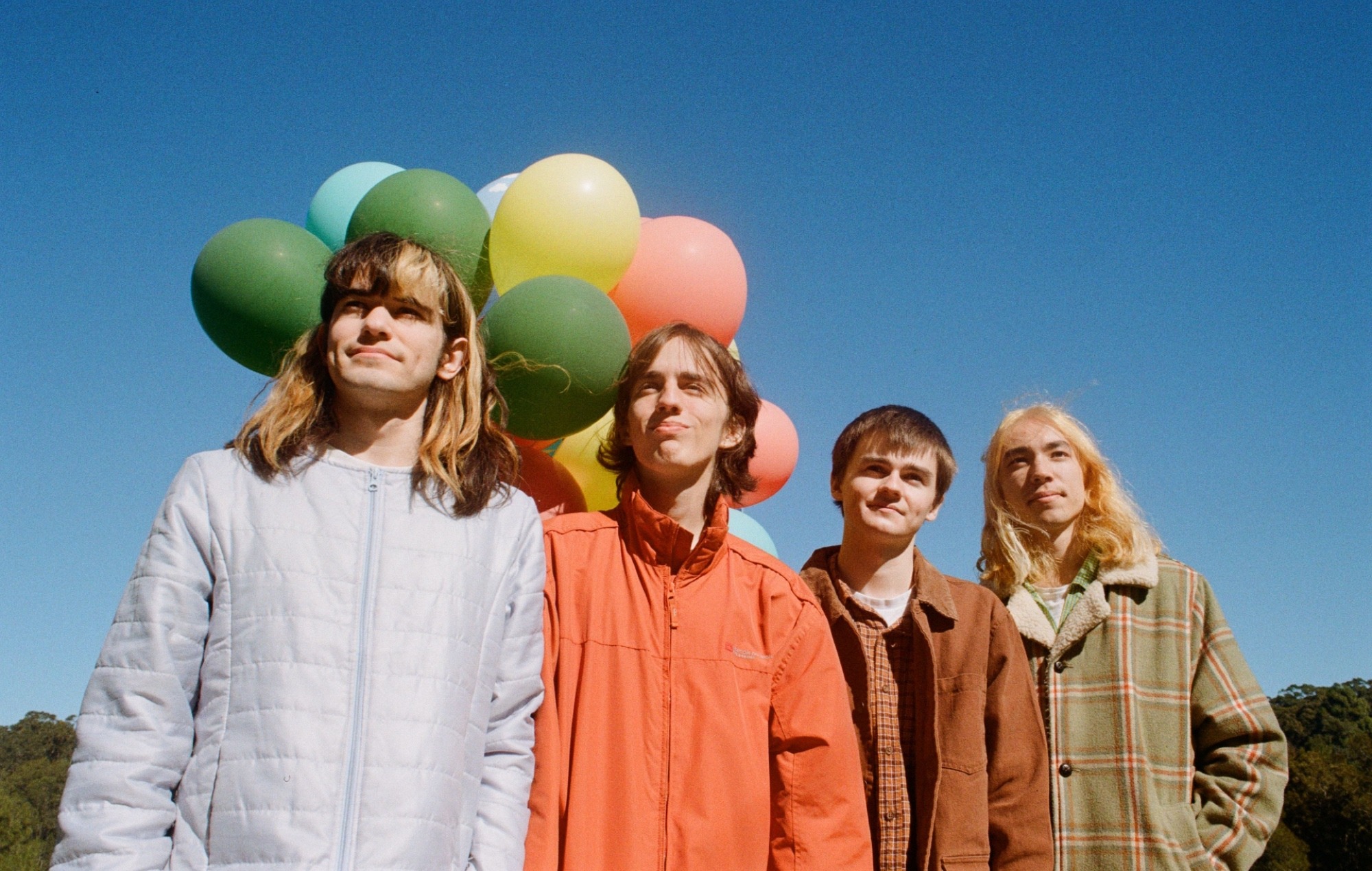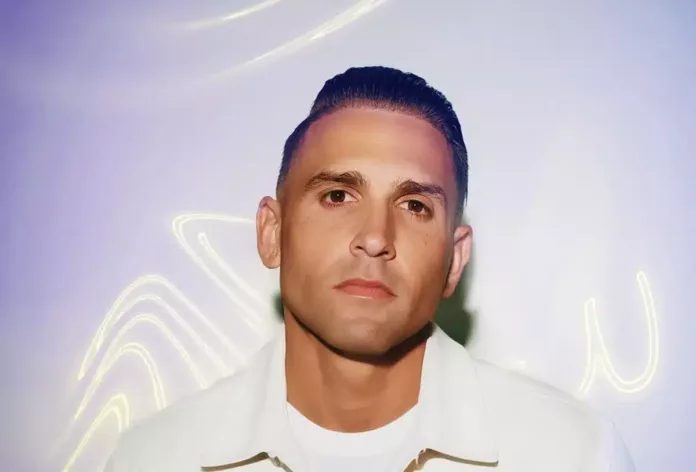
The Lazy Eyes: Aussie psych-rockers gunning to join scene’s greats
The Lazy Eyes might well be staring into another dimension on the vibrant sleeve of their debut album ‘SongBook’. Framed by balloons, stars and a bright blue sky, there’s an instant warmth and familiarity behind the aesthetic, despite the gaze into distant, colourful pastures in the worlds beyond. The same could be said of their music itself, which leans heavily on nostalgia in unearthing a golden past; the waters they charter on the album are not particularly new ones, but there’s always room for a record like this in your collection.
They’ve managed to achieve this in a striking time period, and the Sydney gang have pushed the possibilities of this psych playground for seven years now. Since they met in high school, the band spent their teens perfecting a throwback sound; the magical tones on their two releases thus far – handily titled ‘EP1’ (2020) and ‘EP2’ (2021) – cemented their status as new torchbearers of their country’s well-storied psych scene.
When the band came together in 2014, Tame Impala’s ‘Innerspeaker’ and ‘Lonerism’ had already found global fame, with Kevin Parker heading towards his knockout third full-length ‘Currents’. Elsewhere, King Gizzard were hitting a purple patch, oscillating between fuzzy garage and melodic folk. It was a historic movement for Australian music, and the teens had a front-row seat.
Zooming NME from their Sydney homes, Itay Shachar (vocals, guitar), Harvey Geraghty (vocals, guitar, keyboard), Noah Martin (drums) and Leon Karagic (bass) are all smiles – and shaggy long hair – as they remember those formative days. “It was hard not to be inspired,” Geraghty starts. “Before that, all the successful people you’d see were from America or England, then we suddenly had these Aussie DIY bands just killing it.”
It remains easy to spot The Lazy Eyes’ references, but the band drew from their heroes with a maturity well beyond their years. Their breakout track ‘Tangerine’ was driven by a pulsing bassline and embraced some Gizzard-like abstractism: “Tangerine quarantine my breakfast clubs waiting for me / Marmalade kool-aid grade my test testing stung by a bee”. Elsewhere, the effect-laden guitar jangle of ‘The Seaside’ could have passed for one of Parker’s own creations as they strayed into more heartfelt, dreamy ground that captured the dizziness of a first romance.
The movement took hold when they started writing in their school’s band room as the lunch bell rang. “I think the explosion of the genre really came at the right time for us during those high school years,” says Shachar. “The psych scene was at the peak of its popularity when we were in school, it was inspiring seeing the momentum and how powerful it had become, it’s really impacting for all of us to see these bands taking off from places close to home.”
As the band encroached further into Shachar’s parents’ basement apartment with pedals and amps bought through busking profits, they took the time to grow as producers as much as songwriters. The home-videos they shared at the time capture humid summers spent in the studio, with a relentless dedication to the craft while their mates were out partying. Shachar says the process was gruelling but ultimately rewarding: “We learned from the ground up how to record everything ourselves, it was the most gratifying feeling.”
Entirely self-produced at Lindfield Studios, their converted studio space, ‘SongBook’ (out April 22) picks up on the innocent and explorative path of their first statement of ‘EP1’, which NME said “shows the makings of a psych giant”. Very little has changed aside from upgrading their software from a glitchy Garageband, says Shachar. “It was just us sitting in a room, strumming a guitar, we actually wrote the album closer ‘Cheesy Love Song’ during a lunch break. It’s very wholesome, really.”
Given their earlier releases were as DIY as you can get, did the positive reaction they got blindside them? “We hadn’t released anything before so we had no idea what to expect. We didn’t have any expectations but at the same time we’re really tough critics on ourselves to be really proud of the music we make and that’s really paid off.”

Those innocent days of messing around in the school band room and busking on the streets of Sydney can be heard across ‘SongBook’, which collects the highlights from ‘EP1’ and ‘EP2’ as well as adding new material and flamboyant new strings to their bow. Just take the plaintive opening strum of opener ‘The Island’, or the spritely keys of ‘Imaginary Girl’ – the songwriting, even at its most direct and sparse – shines through.
Geraghty acknowledges that the album resembles the end of a chapter: “We started recording some of those songs at the age of fifteen. It encapsulates the start of the band and all of those first shows we did. All of the songs are the songs we’ve played live since we started the band. This album will be nice just to seal off the first era quite neatly.”
The references to Pond, Tame Impala and King Gizzard are endless, but how does it feel to be mentioned in the same breath as the names that inspired them? Geraghty playfully puts his finger on his lips and Martin laughs. “We were so young when we started recording, it was impossible to not wear our hearts on our sleeves,” Martin says. “We’re very humbled about those comparisons but hopefully as the years go on and we make more music, I think we’ll be able to zone in on what makes us us.”
They’re no one-trick pony though: on the album they’re as comfortable dabbling in gooey piano ballads and harder, Black Sabbath-indebted riffs. Take the swooning Lennon-esque ballad of ‘Imaginary Girl’ in comparison to the heavier and duelling guitars of ‘Where’s My Brain?’ (complete with Bowser laughs lurking in the background). A sense of fun wins over throughout.
A debut album isn’t the only milestone on the horizon for The Lazy Eyes. When we mention the small matter of two looming support dates with The Strokes on home soil – including one in Sydney at the 5500 capacity Hordern Pavillion – they hand over to super fan in the band, Karagic. “The idea of sharing a stage with Julian Casablancas and company is ridiculous. We got the news and I remember being on my balcony and staring off into the sky, like ‘Oh my god, this is not happening.’”
It marks a spiritual moment for the band who once bunked off school to see Pond open for Mark Ronson at the venue. It’s surely the best release party you could ask for? Martin excitedly jumps in: “It’s going to be amazing, I’ve had so many friends book tickets and they didn’t know we were going to be playing, our phones have been filling up.”
When NME caught up with The Lazy Eyes last summer, they said they’re taking it one day at a time, so are they starting to see a bigger picture these days? Geraghty mulls on this before modestly smiling, “I don’t think we’re there just yet, the motivation to make the music was always just because we loved the music, if we end up being able to influence someone else to start another band just like we did, I think that would be the biggest full-circle moment for us.”
The Lazy Eyes’ debut album ‘SongBook’ is due out April 22
Radar Roundup: sign up and get our weekly new music newsletter



